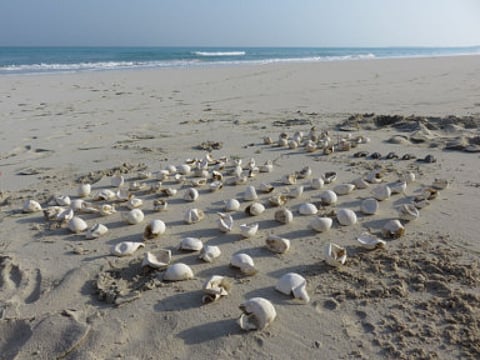Saadiyat has 184 reasons to be egg-cited
Critically endangered hawksbill turtles hatch on island off Abu Dhabi coast

ABU DHABI Over 180 hawksbill turtles, a critically endangered species, have hatched on Abu Dhabi’s Saadiyat Island.
“As many as 300 eggs were laid during the nesting season between March and May. Of them, 184 hatched. We are pleased that despite all the development happening around the island, the turtles came back and laid eggs,” said Arabella Willing, marine biologist, Park Hyatt Abu Dhabi Hotel and Villas on Saadiyat Beach. Willing has been working closely with the Tourism Development and Investment Company (TDIC) to protect the turtles.
“The hawksbill turtles usually live in the sea, but lay eggs on land. An adult female can lay more than 100 eggs,” she said.
Hatching process
The entire process of nesting and hatching happens during night – away from the prying eyes of predators. “A turtle egg is as big as a ping pong ball. The shell is leathery and soft. The eggs take anywhere between 50 and 65 days to hatch.”
“The adult females always choose the beach they were born on to lay their eggs. The turtles nesting here were probably born on Saadiyat years ago. Hopefully, some of them will come back to the island after 30 years to lay their own eggs,” she said.
“The turtles take about 15-30 years to reach maturity. It will be a long time before they return and many won’t survive the journey. Going by statistics, only one or two eggs in a 1,000 become adults.”
As part of their hawksbill turtle conservation programme, TDIC is also spreading awareness about these rare creatures. Hotel guests and residents have been asked to switch off outdoor lights when they are not outside, close curtains at night to minimise light spill, refrain from going to the beach after dark and avoid turtle tracks so they can be recorded by TDIC
“Any trash or litter on the beach is bad for turtles. Nearly 60-80 per cent of turtles found dead had litter in their stomach. We are doing all we can to educate Saadiyat beach goers to keep the place clean,” said Willing.
Dr Nathalie Staelens, head of Environmental Services at TDIC, said they have taken serious steps to guarantee that the turtles return to Saadiyat to lay their eggs. This includes the establishment of the Saadiyat Dune Protection Zone as well as restricting resort development on Saadiyat Beach to at least 60 metres back from the seaward edge of the coastal dunes.


